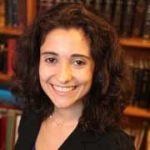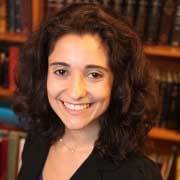Just Thought is a series of essays from AJWS applying Jewish wisdom to the pursuit of tikkun olam today. Drawing upon Jewish history, Torah sources and the latest headlines, we plumb pressing questions about human rights and global justice from a Jewish perspective through monthly essays by noted scholars, activists and AJWS staff.
You shall not wrong a stranger or oppress him, for you were strangers in the land of Egypt. You shall not ill-treat any widow or orphan. If you do mistreat them, I will heed their outcry as soon as they cry out to Me, and My anger shall blaze forth and I will put you to the sword, and your own wives shall become widows and your children orphans.
—Exodus 23:20-23
Again and again, the Torah calls our attention—through both law and stories—to the need to care for widows. At first, this seems like a matter of pity. After all, the book of Lamentations compares the destroyed city of Jerusalem to a widow: “Alas! Lonely sits the city … she is become like a widow,” utterly destroyed and entirely helpless. It’s not surprising that the Torah groups widows with orphans and strangers, the two other groups in biblical society deemed as uniquely vulnerable.
Though the Torah’s intention is to help women in need, this distinction can feel demoralizing. A woman who was previously an important community member might now find herself stripped not only of her husband, but of dignity, agency and even membership in the community.
The picture seems bleak, but if we stop our exploration here, we miss out on understanding the complex, nuanced role that widows play in the biblical narrative. While a widow can be vulnerable and eclipsed to the margins of society, that same marginal status affords her a unique form of power.
We see this unique power play out through the stories of two famous biblical widows, Tamar and Ruth. Each of these women finds herself on the physical and metaphorical outskirts of the community. In the book of Genesis, Tamar sits at a crossroads between towns. And we encounter Ruth gleaning wheat from the corner of a farmer’s field among the poor. The women’s physical locations drive home the point that they are indeed marginal to society. Yet, it is precisely these locations on the margins that offer each of them the ability to fly under the radar, break some rules and become an active player in our biblical stories. Where most women in the bible go unmentioned, these two are too important to ignore.
Tamar uses the seeming invisibility of her widowhood to correct an injustice done to her. After her second husband dies, she is obligated by tradition to marry her deceased husband’s youngest brother—for her own protection and to produce an heir. And yet, her father-in-law Judah refuses to marry them. He also refuses to free Tamar from this obligation, leaving her in limbo—unable to marry anyone else. Taking matters into her own hands, Tamar dons a veil and, posing as a prostitute, waits in the road for Judah. Judah sleeps with her without seeing her or recognizing who she is. This seeming power of invisibility allows Tamar to put Judah in a compromising position. When Judah realizes his mistake, he declares that Tamar is “more righteous than I.”
Similarly, Ruth’s status as a widow and an outsider places her in the role of poor person collecting food left in the field. Because of this action, she is able to meet and marry Boaz—a pairing that will be important for Jewish history. It is her widowhood that allows her to become the ancestor of King David and a hero of rabbinic imagination as the primary role model after which we design the entire process of conversion to Judaism.
The legal system in the Torah echoes this marginal power, by awarding widows a level of autonomy unique within their gender. For example, widows and divorcees are the only women responsible for fulfilling their own vows—whether they’ve promised something to a fellow person or to God. When married women and young girls make vows, their husbands’ or fathers’ have the power to annul those vows. In this way, being outside of biblical society’s image of “woman” allows widows to escape the confines of the patriarchy—and that has some benefits—or at least, it comes with a certain kind of power.
To be sure, no one wishes for their spouse to die, and widows do often need extra care and support from their communities. But they are not necessarily weak, pathetic or powerless. In fact, living on the margins offers a kind of power. People on the margins play a unique role in the fabric of society.
So—who are these “widows” in our world? Today, this framework—and the mandate of care that comes with it—may be expanded to include any group of people who are marginal but also empowered. Today, individuals in the disability, LGBT and women’s movements all embrace and find pride in the ability to cultivate power and make change from their unique vantage point outside the center of society.
In addition to providing concrete forms of care, let us recognize the power of marginalized groups by celebrating the contributions they have made throughout history—and the contributions they continue to offer society today.
 Rabbi Avi Killip serves as VP of Strategy and Programs and Director of Project Zug at Mechon Hadar. Avi was ordained from Hebrew College’s pluralistic Rabbinical School in Boston. She is a Wexner Graduate Fellow and holds a Bachelors and Masters from Brandeis University in Jewish Studies and Women & Gender Studies. Avi has worked as a teacher and Jewish professional in two synagogues, an independent minyan, a mikveh, and a yeshiva.
Rabbi Avi Killip serves as VP of Strategy and Programs and Director of Project Zug at Mechon Hadar. Avi was ordained from Hebrew College’s pluralistic Rabbinical School in Boston. She is a Wexner Graduate Fellow and holds a Bachelors and Masters from Brandeis University in Jewish Studies and Women & Gender Studies. Avi has worked as a teacher and Jewish professional in two synagogues, an independent minyan, a mikveh, and a yeshiva.


